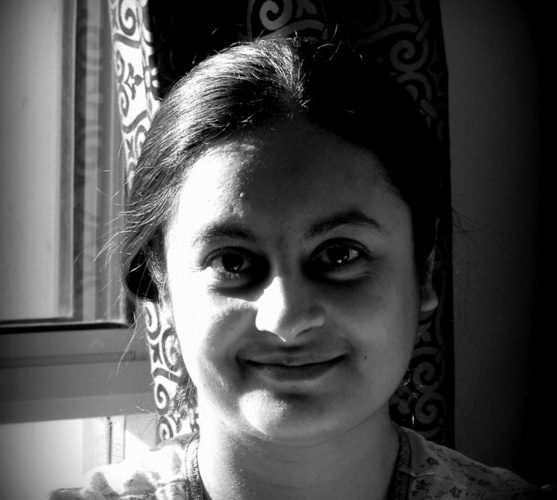1.
HOW I MISS YOU
I miss you like I miss the memory
of things I once couldn’t forget if
I tried to. Like the leaves of the tree
under which the market presswallah
wielded his heavy iron on the entire
neighbourhood’s rumpled crease.
Like the minstrel’s khanjani, portable
cymbals of wistful supplication. I
miss you like the absent compressor
of our dysfunctional refrigerator, its
garish orange paint a reminder of
a well-wisher’s gigantic kindness
in selling us her relic. When it no longer
cooled water or made ice, Uncle made
It his secret cabinet for stashing the
diaries no one could read anyway.
Not even him. I miss you like the boy
Uncle must have once been, con brio,
wanting to love, seeking home. I miss you
like the illusory promise in the songs we
bellowed in school praising our nation, a
sordid country of uneven ladders. I miss
you the way we miss things not exactly
lost and no longer easily found.
2.
SATURDAY MORNINGS AT THE LANGUAGE CLASS
The generosity of a weekend morning
and a teacher’s unlocked house. Her
trust in us, somewhat excessive. To
leave the property to a bunch of inquisitive
adolescents; there, less for language
learning and more for the telephone to
make prank calls with, just a few, before
the elderly tutor arrived. To then settle
down on the sofa like monastic disciples
awaiting ordination. With the trail of lessons
moving through villages, bullock carts and
heaving rivers, to let the eye settle on a
glass cabinet housing pretty dolls in
traditional finery — Japanese, Bengali,
Rajasthani. The teacher’s off-school
diversion. After the class — a walkabout of
everything from the classics and satire to
home-brewed verses on bygone Saturday
mornings — pottering over to the dining table
to uncover surprises waiting in neat porcelain
saucers. Tea cakes, cookies, seasonal savouries.
Bribes the teacher cooked to entice some
not-so innocent teenagers to bite into the
mother tongue just a bit deeper.
3.
SILENT LOVE
The work day is about to end.
Shahid Parvez comes on the
auto play loop as if to save the day
from its scandalous mundanity.
The Bageshree on his strings
sounds familiar yet unknown. In
its mellowness, its tender
sobriety, it wraps the late afternoon
hours in midnight shadows, inscrutable, amorphous.
Following the trail of the notes,
the eye travels beyond the screen
and rests on two spotted doves
courting each other in early spring.
The closed window mutes their cooing.
For what it is worth, their amorous
preening must do with the sitar’s soundtrack.
It works. Something about an afternoon’s
stupor, a dove couple pecking on each
other’s necks on a sunny roof and
a musician’s liquid thrums of a night song
conjure a patch of Shangri-La. So much
love transpires. Not a word is spoken.
Bageshree is a Hindustani classical raga. It is a popular raga of the late night, which is meant to depict the emotion of a woman waiting for reunion with her lover.
4.
FATHER AND SON IN MEXICO CITY
Jacarandas proclaim their
dominion of the skies. A cotton-soft
breeze blows through promenades
and parks. Every evening, families
gather by the celebration square,
open mercados, sidewalks and street
corners to leave behind and forgive
the day. Tourists pour into Zocalo,
the scent of grilled meat teasing them
to reach for tequila shots. With the
unfaltering step of their stilettos,
stylish women enter a clothing store, its
signboard swelling with the self-assured weight of
an international retail brand.
Outside the storefront, a man and a boy
belt out rancheras, their comportment
oddly contrasting their footing. The two singers
strum guitars with nimble grace.
An upturned sombrero hat sits at their feet,
its mouth politely accepting coins from passersby.
Some stand and listen to the father and son
as the remainder of the family looks on from
behind; the mother feeds her infant daughter.
I pause to rest my gallivanting feet.
To take in this mellifluous tranquility in
the middle of a crowded city square.
To marvel at the sight of a family that sings together
so it can stay together,
one note and one penny at a time.
*









Add comment